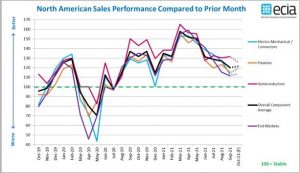ECIA Releases Industry Sentiment Update for September
ATLANTA – The latest results from ECIA’s Electronic Component Sales Trend (ECST) surveys for September and Q3 2021 point to an apparent stabilization of growth in recent months following wide swings in growth expectations over the past 20 months. The index average for growth expectations for overall components ranged between 120.0 and 127.0 between September and the October outlook. Similarly, expectations for overall end-market growth fell within a range of 111.4 and 115.4 in the same period. By comparison, the overall component index fell from 157.7 to 127.0 between March and August 2021 with the end-market index following a similar profile.
“While the detailed Electronic Component Sales Trend (ECST) report shows a significant difference in variability/volatility between various component sub-categories and end-markets, the overall picture of a more stable growth profile is encouraging for supply chain participants working to manage in a very challenging environment,” noted ECIA Chief Analyst Dale Ford. “We continue to point out that any score above 100 indicates growth expectations. So, while the level of the index has fallen it continues to point to ongoing growth.”

To access the complete Industry Sentiment Update, go to Industry Sentiment September and Q3 2021 Outlook Article.pdf.
The complete ECIA Electronic Component Sales Trends (ECST) Report is delivered to all ECIA members as well as others who participate in the survey. All participants in the electronics component supply chain are invited and encouraged to participate in the report so they can see the highly valuable insights provided by the ECST report. The return on a small investment of time is enormous!
The monthly and quarterly ECST reports present data in detailed tables and figures with multiple perspectives and covering current sales expectations, sales outlook, product cancellations, product decommits and product lead times. The data is presented at a detailed level for six major electronic component categories, six semiconductor subcategories and eight end markets. Also, survey results are segmented by aggregated responses from manufacturers, distributors, and manufacturer representatives.











